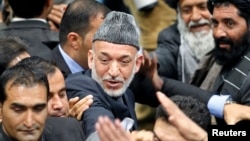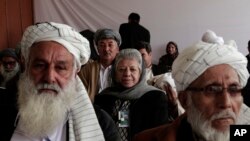ISLAMABAD —
Security analysts in Kabul are warning of dire consequences in the region if Washington and Kabul cannot resolve a standoff over a key bilateral security agreement. Afghan President Hamid Karzai is refusing to sign the deal until next year, which Washington says could lead to a complete withdrawal of U.S. forces before the end of 2014.
In Kabul there are growing worries that President Hamid Karzai's surprise refusal to sign the security pact with the United States could have dire consequences for the country's future.
Mirwais Muqbil, from the Kabul-based political consulting group Hambastagi, says everybody is worried about Karzai's decision.
“It's a disastrous step and it will have dire consequences on the political and social situation in Afghanistan," he said.
The security agreement spells out terms under which an estimated 10,000 U.S. troops would remain in Afghanistan to assist the government in its war against Taliban insurgents. It also involves billions of dollars worth of assistance to the Afghan security forces and Afghanistan's fledgling democratic institutions.
During a meeting in Kabul on Monday, Karzai told visiting U.S. National Security Adviser Susan Rice he would not back down from his refusal to sign the agreement.
Instead, the Afghan leader laid out new demands, including further assurances that U.S. forces would not raid Afghan homes and that America express a sincere commitment to help start stalled peace talks with the Taliban. He also reiterated his demand that the United States commit to ensuring free and transparent presidential elections in Afghanistan on April 5.
In neighboring Pakistan, Political analyst Rasul Baksh Rais also is worried about Karzai's stance. He says Washington's so-called zero option, whereby no U.S. forces stay behind after 2014, would open the door to more violence.
“If this deal is not signed, then jihadi militancy in Pakistan will increase, it will be on much larger scale, larger numbers of people will be moving into Afghanistan to fight along the Taliban, and I don't think they will stay in Afghanistan forever," Rais said. "They will also be coming back and pursuing the same agenda of jihad against the Pakistani state.”
On Sunday, the Loya Jirga, or council of tribal elders convened by Karzai endorsed the bilateral security agreement with the United States and called for the president to sign it immediately.
Once signed, the accord would take effect January 1, 2015.
All international combat forces in Afghanistan are scheduled to withdraw from the country by the end of 2014.
In Kabul there are growing worries that President Hamid Karzai's surprise refusal to sign the security pact with the United States could have dire consequences for the country's future.
Mirwais Muqbil, from the Kabul-based political consulting group Hambastagi, says everybody is worried about Karzai's decision.
“It's a disastrous step and it will have dire consequences on the political and social situation in Afghanistan," he said.
The security agreement spells out terms under which an estimated 10,000 U.S. troops would remain in Afghanistan to assist the government in its war against Taliban insurgents. It also involves billions of dollars worth of assistance to the Afghan security forces and Afghanistan's fledgling democratic institutions.
During a meeting in Kabul on Monday, Karzai told visiting U.S. National Security Adviser Susan Rice he would not back down from his refusal to sign the agreement.
Instead, the Afghan leader laid out new demands, including further assurances that U.S. forces would not raid Afghan homes and that America express a sincere commitment to help start stalled peace talks with the Taliban. He also reiterated his demand that the United States commit to ensuring free and transparent presidential elections in Afghanistan on April 5.
In neighboring Pakistan, Political analyst Rasul Baksh Rais also is worried about Karzai's stance. He says Washington's so-called zero option, whereby no U.S. forces stay behind after 2014, would open the door to more violence.
“If this deal is not signed, then jihadi militancy in Pakistan will increase, it will be on much larger scale, larger numbers of people will be moving into Afghanistan to fight along the Taliban, and I don't think they will stay in Afghanistan forever," Rais said. "They will also be coming back and pursuing the same agenda of jihad against the Pakistani state.”
On Sunday, the Loya Jirga, or council of tribal elders convened by Karzai endorsed the bilateral security agreement with the United States and called for the president to sign it immediately.
Once signed, the accord would take effect January 1, 2015.
All international combat forces in Afghanistan are scheduled to withdraw from the country by the end of 2014.













